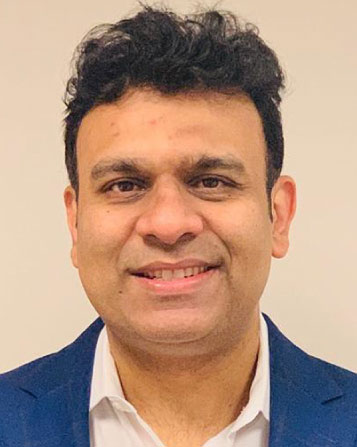Preparing Students and Organizations for Cyberattacks
Digital forensics and cybersecurity expert Jibran Ilyas (MSIT ‘09) discusses how to protect against data breaches and how he uses his experiences to help shape Northwestern Engineering's Master of Science in Information Technology (MSIT) program.
 Jibran Ilyas (MSIT ‘09) has investigated some of the most widespread data breaches in history. He’s defended Fortune 100s against cybercrime and state sponsored cyber espionage. He has been recognized internationally as a thought leader on cybersecurity.
Jibran Ilyas (MSIT ‘09) has investigated some of the most widespread data breaches in history. He’s defended Fortune 100s against cybercrime and state sponsored cyber espionage. He has been recognized internationally as a thought leader on cybersecurity.
And now, he’s helping shape the curriculum and experience for students in Northwestern Engineering's Master of Science in Information Technology (MSIT) program.
As an MSIT Industry Advisory Board (IAB) member and adjunct faculty, Ilyas shares insights into the most pressing issues facing the industry. It’s his way of giving back to his alma mater while preparing the next generation of IT leaders.
“Having an influence and helping to constantly improve curriculum that produces global leaders of our times is nothing less than a huge honor,” Ilyas said. "Using my industry knowledge to influence MSIT decision-making gives me great joy."
During Ilyas’ time in MSIT, he rounded out his technical skills with business acumen. This allowed him to lean into management and learn how to lead a team.
Today, Ilyas works as a managing director at Mandiant (formerly FireEye), where he helps some of the world’s largest companies defend themselves against ever-increasing cybersecurity threats. His specialties are in incident response, digital forensics, and threat intelligence, and his current role allows him to lead a “war room” of cybersecurity experts after organizations suffer data breaches. In this role, he advises the executive team on containment, remediation and post-mortem of the incident, collaborating with the organization's internal teams.
“In my job, it’s critical to understand when to lead from the front and when to let others shine with full empowerment,” Ilyas said. “Due to the cohort format of the [MSIT] program, I learned to work in teams for an extended period of time. We all had courses where we were leaders and where we were followers.”
In addition, Ilyas co-leads Mandiant's Cyber Risk Partnerships with law firms, cyber insurance carriers, and brokers who assist organizations with their data breaches. He frequently participates in speaking engagements at cybersecurity conferences, in webinars, and directly with mutual clients.
He’s eager to share his insider’s perspective with MSIT students — and correct some common misconceptions about the field.
“The biggest myth is that cybersecurity is a responsibility of the IT or security team,” Ilyas said. “Cybersecurity is corporate security and national security. Data is the new oil, and the confidentiality, integrity, and availability of the data is critical to organizations of all types and sizes.”
To help prevent major attacks, Ilyas recommends companies first decide what data needs to be protected most, and then work backward.
“Organizations need to understand how that data flows within the network and who is authorized to access the data," he said. "It’s not enough to add ‘bank vault-like security’ on critical assets, but proper alarms are needed, too, so that organizations can take action before large amounts of data are transferred to unauthorized parties.”
Today’s challenges require a seismic shift in the way organizations treat security. It’s not enough to install technical solutions, Ilyas said. Cybersecurity must become every employee’s responsibility. IT managers must practice the art of diplomacy to drive organizational change.
"Just like we explain to our kids the 'why' of things to achieve the best results, we need to educate everyone in the organization about cyber attacks and their impact," he said. "That way, everyone owns cybersecurity initiatives and treats them like a team sport."
It’s this lesson that he hopes to impart on MSIT students.
“We can no longer afford to treat cybersecurity as an afterthought,” he said. “It needs to be integrated in decision making from the start.”

